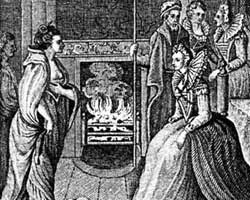On completing the switchover to our own names, discovered that all our prior posts had been transformed as well. To a new reader to the blog, it'll look as if we've all always written in our
 own names -- and not in the name of a transnational foremother, as we did for nearly a year. The sole exception is Eleanor Roosevelt. There's a technical reason for that, but we at IntLawGrrls prefer to think that it's because Eleanor simply must remain as an inspiration to us all.
own names -- and not in the name of a transnational foremother, as we did for nearly a year. The sole exception is Eleanor Roosevelt. There's a technical reason for that, but we at IntLawGrrls prefer to think that it's because Eleanor simply must remain as an inspiration to us all.Sadly, my own namesake fell prey to the technological erasure. Can't let her go without this tribute:
For centuries Gráinne Ni Mháille -- to anglophones, Grace O'Malley -- has enjoyed renown as The Pirate Queen. Earning that title was no small thing in the time and place that she lived, 1530 to 1603, in a castle on Clare Island that accepts visitors to this day. Legend has it that O'Malley overcame male prejudice to control a swath of the West of Ireland. She fought off an attack at sea while nursing her day-old son, and wrested from England's Quee
 n Elizabeth I a concession to ply her pirates' trade along Ireland's Atlantic coast. (Am I mistaken, or is that the original ER bowing to Grace in the print at right?) In all this, of course, O'Malley proved herself an early and powerful nonstate actor.
n Elizabeth I a concession to ply her pirates' trade along Ireland's Atlantic coast. (Am I mistaken, or is that the original ER bowing to Grace in the print at right?) In all this, of course, O'Malley proved herself an early and powerful nonstate actor.Tales of her exploits still are told today, in children's books and travelogues, in songs like "Grace O'Malley" and "Óró sé do bheatha 'bhaile," in theaters on both sides of the pond, even on MySpace. Given the status of women in 16th C. Ireland, the tales may be taller than the reality, but they inspire nonetheless.
A heartfelt Go raibh maith agat to Grace, who'll remain honored in my profile and perched on my shoulder as I post in my own name.
* Know the origin of this catchphrase? If so, you're either: (a) Partial to Mid-20th Century Television; or (b) a Person of a Certain Age. No need to say which it is...



